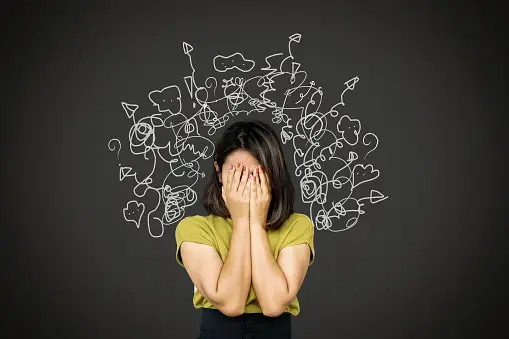Leading Experts Identify ‘Epidemic Of Anxiety’ and Call for Empowerment Tools
New research reveals that half (48%) of all adults in the UK experience anxiety, equating to nearly 26 million people.[i] Given the widespread prevalence of this mental health condition, leading health experts have identified an ‘epidemic of anxiety’.
Commenting in a new ‘Empowerment in the Epidemic of Anxiety Report’,[ii] the panel of community and industry health experts highlighted the growing burden of mental health issues on an already overstretched NHS. They conclude that the way forward must include empowering and supporting those with mild anxiety to develop coping strategies.
Surge of Anxiety
The UK has seen a marked rise in generalised anxiety over the past decade, especially among younger people and women.[iii] Over 8 million people (around 1 in 10) are living with a diagnosable anxiety disorder at any one time,[iv] but this may not paint the whole picture. New research commissioned by Kalms Herbal Remedies shows that half (48%) the adult population often suffers from anxiety at a level that impacts their day-to-day living.i
Dr Sarah Jarvis, general practitioner, clinical consultant and expert panellist, comments: “We have a perfect storm of issues in relation to anxiety. The figures for people suffering with anxiety have increased considerably during the pandemic. To add to the problem, waiting lists for mental health services have increased further. This lack of availability of service inevitably has a huge impact on general practice as well – people with anxiety consult their GP more often, and I have found it increasingly difficult to be able to offer services for people at the milder end of the anxiety and depression spectrum.”
Self-Help Toolbox
To help prevent mild anxiety from progressing, and to improve the quality of people’s lives sooner, the expert panel recommend that people utilise a ‘mild anxiety toolbox’ – a series of powerful, evidence-based tools that can be employed into everyday life.
Talking therapies are a mainstay for many mental health concerns, including anxiety. Several of the methods used in formal talking therapies can be adapted and learned as a form of self-help therapy without the assistance of a professional.[v] For example, CBT-inspired self-help strategies and techniques such as reframing helpful thoughts, tackling worries and facing fears can be practiced at home.
Complementary therapies or practices can be integrated into everyday life to either help ease mild anxiety symptoms or to help prevent anxiety altogether. For example, mindfulness can work well alongside yoga and hypnotherapy. Developing an awareness of one’s thoughts, feelings and behaviours can help to break negative habits and improve self-esteem. vi,[vi]i
Lifestyle changes such as getting more sleep, eating a balanced diet, limiting caffeine and alcohol, and exercising can go a long way toward easing anxiety. For example, just 30 minutes or more of exercise a day for three to five days a week can significantly improve anxiety symptoms.[vii]i
Numerous de-stressing and mood-boosting apps are available to help reduce anxiety. A good place to start is the ‘Hub of Hope’ app – the UK’s leading mental health support database, which brings local, national, peer, community, charity, private and NHS mental health services together in one place. Some mild anxiety sufferers may also benefit from group discussions; organisations offering a range of resources include Anxiety UK, SANE and Mind.
Many people rely on herbs to help with mild to moderate mental health conditions, including anxiety, whilst avoiding the unwanted and negative side effects of medications. For example, studies have shown reductions in cortisol levels and anxiety following the use of ashwagandha.ix Lavender oil contains terpenes, such as linalool and linalyl acetate, which may have a calming effect on chemical receptors in the brain.ix,x Studies have shown that a daily capsule of pharmaceutical-quality lavender oil, found only in Kalms Lavender, is as effective as commonly prescribed anti-anxiety medications such as lorazepam and paroxetine.xi, xii
If mild anxiety worsens or becomes disabling, the next step is seeking professional help in order to receive an accurate diagnosis and effective treatment.
-Ends-
[i] Survey by Census Wide, commissioned by Lanes Health. Conducted on 3,726 Respondents – including 2,000 nationally representative respondents. October 2023.
[ii] Lanes Health. Empowerment in the Epidemic of Anxiety: Equipping patients and healthcare providers with the necessary tools and skills to manage mild anxiety. 2023.
[iii] The Guardian. UK has experienced ‘explosion’ in anxiety since 2008, study finds. September 2020. Available at: https://www.theguardian.com/society/2020/sep/14/uk-has-experienced-explosion-in-anxiety-since-2008-study-finds (Accessed: April 2023).
[iv] Mental Health UK. What is anxiety? Available at: https://mentalhealth-uk.org/help-and-information/conditions/anxiety-disorders/what-is-anxiety/ (Accessed: April 2023).
[v] Mental Health UK. Treatments for anxiety disorders. Available at: https://mentalhealth-uk.org/help-and-information/conditions/anxiety-disorders/treatment/ (Accessed: May 2023).
[vi] Royal College of Psychiatrists. Hidden waits force more than three quarters of mental health patients to seek help from emergency services. October 2022. Available at: https://www.rcpsych.ac.uk/news-and-features/latest-news/detail/2022/10/10/hidden-waits-force-more-than-three-quarters-of-mental-health-patients-to-seek-help-from-emergency-services (Accessed: April 2023).
[vi]i Mind. Types of complementary and alternative therapies. Available at: https://www.mind.org.uk/information-support/drugs-and-treatments/complementary-and-alternative-therapies/types-of-complementary-and-alternative-therapies/#Hypnotherapy/ (Accessed: May 2023).
[vii]i Mayo Clinic. Depression and anxiety: Exercise eases symptoms. September 2017. Available at: https://www.mayoclinic.org/diseases-conditions/depression/in-depth/depression-and-exercise/art-20046495 (Accessed: May 2023).
ix Salve J, et al. Cureus. 2019;11(12):e6466.
x Malcolm BJ and Tallian K. Ment Health Clin. 2018;7(4):147–155.
xi Woelk H and Schläfke S. Phytomedicine. 2010;17(2):94–99.
xii Kasper S, et al. Int J Neuropsychopharmacol. 2014;17(6):859–869.

